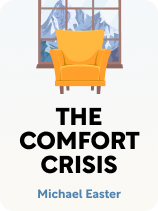

This article is an excerpt from the Shortform book guide to "The Comfort Crisis" by Michael Easter. Shortform has the world's best summaries and analyses of books you should be reading.
Like this article? Sign up for a free trial here.
How often does your brain get to rest? Do you have near-constant stimuli from technology and other inputs?
Modern society seems to shun boredom. You probably sense a need to stay occupied, busy, and productive. The problem is that this doesn’t give your brain a break. Michael Easter contends that this is one of the problems of the modern world that you should fight back against.
Keep reading to learn several benefits of boredom.
The Benefits of Boredom
Modern technology impedes boredom by tempting our attention whenever our mind starts to drift to uncomfortable territory. On average, we spend 11.6 hours with digital media each day. This includes time on our phones, in front of TVs, and on our computers. When we’re focused on social media and entertainment, we don’t have time for boredom.
Easter defines boredom as a state of unfocused mental rest and openness. He describes three benefits of boredom.
Benefit #1
Boredom is important for our mental health because it allows our minds to decompress. Because the constant stream of virtual stimulation available today has our attention in a stranglehold, we rarely allow ourselves a chance to rest our minds. As a result, we burn out our brains. When our brains tire from too much time engaging with digital media, we feel more irritable, impatient, and upset. This also can lead to anxiety and depression and decrease our sense of meaning in life.
(Shortform note: Another way digital media disrupts our emotions is by weakening our ability to regulate our emotions through internal control and healthy relationships. Because we constantly scroll Instagram or watch YouTube when we feel something unpleasant, we miss out on opportunities to train ourselves to process difficult emotions on our own or with the assistance of close friends or family, which are more effective strategies for managing your emotions.)
Benefit #2
Boredom improves our creativity. One study found that participants who performed boring activities (such as reading a phone book for 15 minutes) demonstrated much stronger creativity than participants who didn’t endure a boring activity. This is because boredom puts your mind into an unfocused state that allows you to be open to more ideas.
Benefit #3
The discomfort of boredom can also motivate you to be more productive. Until recently, humans didn’t have distractions like phones to numb our brains at the first inkling of discomfort. So, we’d have to find other ways to channel our boredom, such as improving a shelter or finding a more productive way to catch food.
(Shortform note: In Atomic Habits, James Clear points out that boredom can tempt us to stray from good habits that align with our goals. This is because we mistakenly perceive boredom as an indicator that we need to do something new, which can disrupt habits that might be helping us reach our greater goals. Clear emphasizes that everyone occasionally gets bored of their habits on the path to their goals, but successful people are able to push through boredom and perform consistently. In comparison, Easter embraces the impulsive detours that boredom might inspire because they can lead to more creativity and productivity. Regarding habits aimed at a goal, Easter might say to embrace these detours if they align with your goal.)

———End of Preview———
Like what you just read? Read the rest of the world's best book summary and analysis of Michael Easter's "The Comfort Crisis" at Shortform.
Here's what you'll find in our full The Comfort Crisis summary:
- Why a modern, comfortable lifestyle is bad for health and happiness
- Why discomforts such as being in nature, fasting, and exercising are important
- Tips on how to make discomfort your friend






